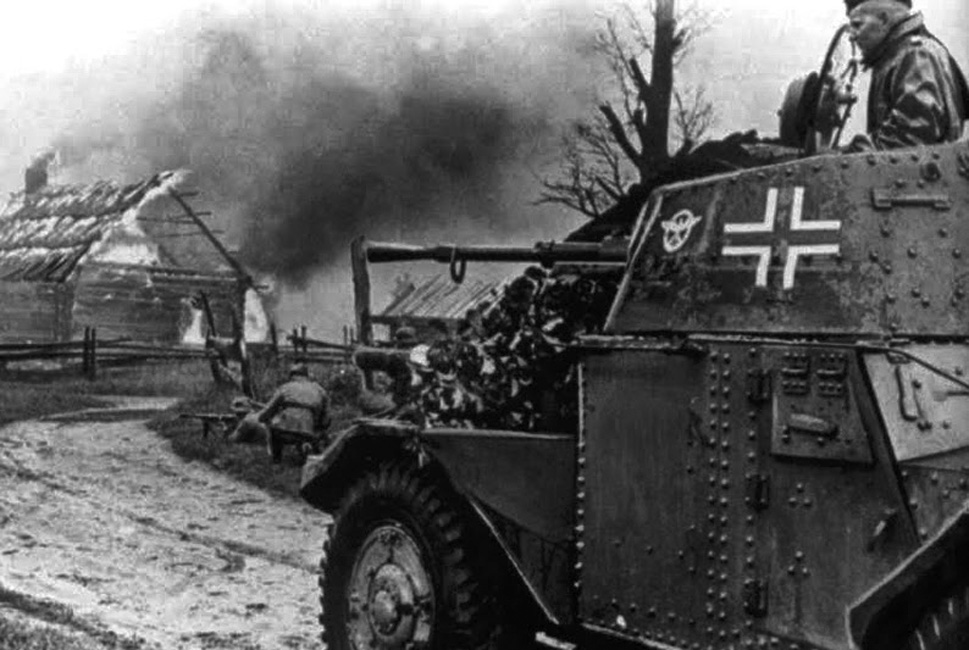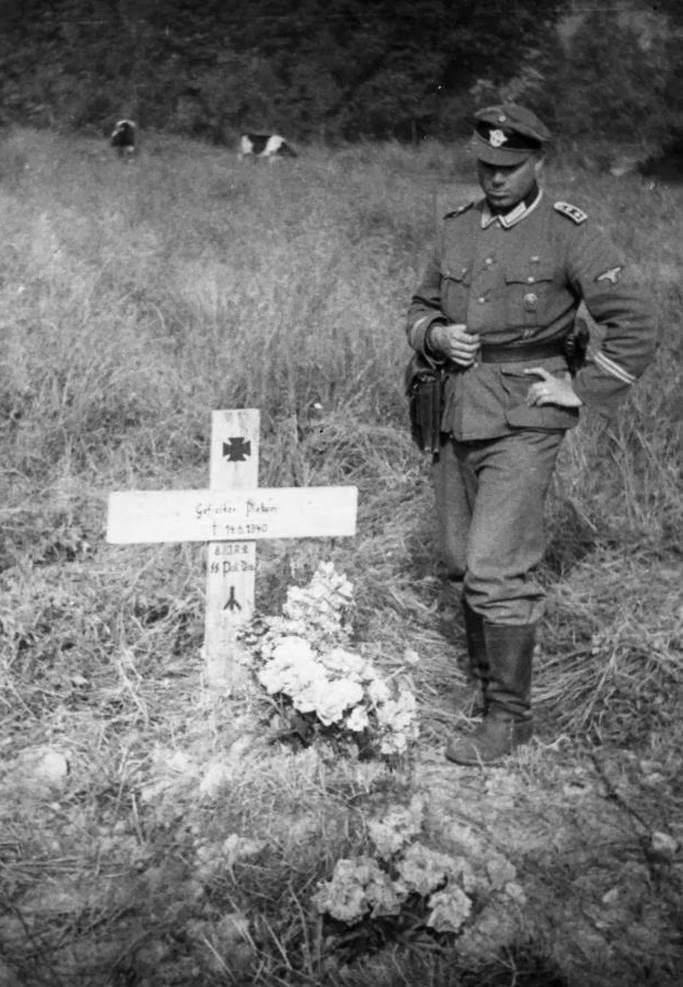
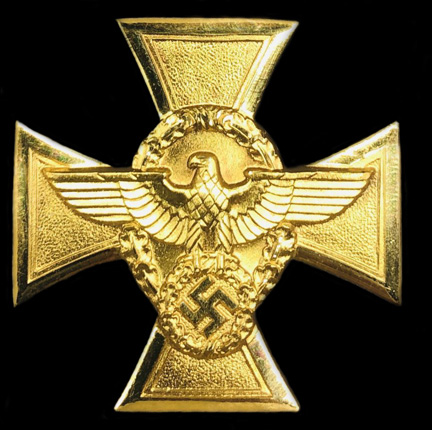
Interview with Knight's Cross winner and Battalion Commander Heinz Jürgens of 4. SS-Panzergrenadier Division Polizei, Landau, 1988.
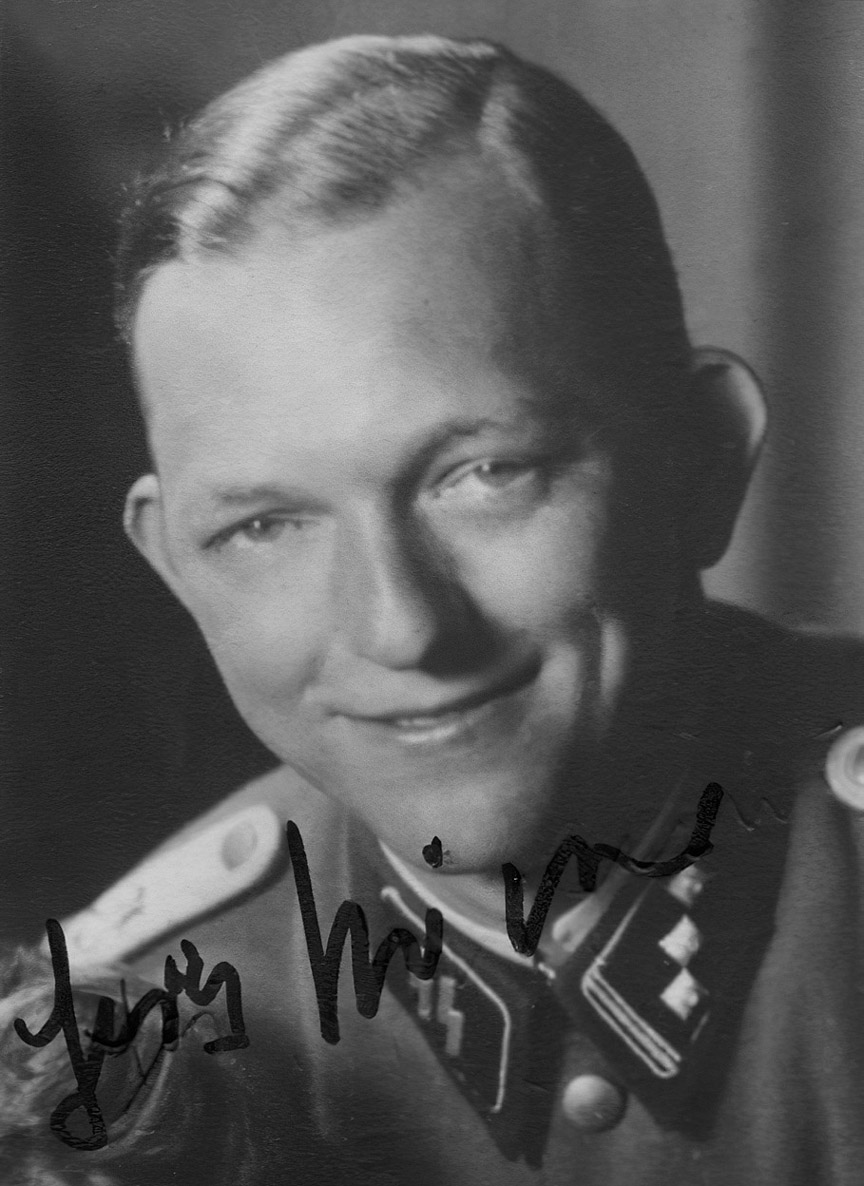



Interview with Knight's Cross winner and Battalion Commander Heinz Jürgens of 4. SS-Panzergrenadier Division Polizei, Landau, 1988.


Heinz: Yes sir, how I came to join the SS? I suppose it was a sense of duty to the nation, my father instilled this. I had wanted to be part of the police since I was very young. I was a part of the HJ [Hitler Youth] and they instilled in all the boys a deep sense of love for your people and land. The HJ was much like any other youth club in the world; we camped, learned about nature and practiced sports. Some of the older boys could learn military traits if they thought they may enlist later. I was one of these lads, soldiers would come to speak to us and show us military life. Parents had to approve of this. I also knew about the SS and that they were elite men of the highest caliber. You had to be tall, fit, and genetically healthy to get in. We had one of the old guard speak to our troop, and he spoke about the early years of struggle. He was with the Führer in Munich on the 9th of November and wore the Blood Order.
He said that anyone wanting to get into the police should go to the
SS first to get military training out of the way, and then entrance was greatly
helped. This made me perk up, so I was determined to get into the SS first,
after my time with labor [Reichsarbeitsdienst, or Reich Labor Service, RAD)]. I was accepted and sent to the regiment Germania,
in the first battalion.
That started my time in 1937, and I was able to apply for the police
as well and was accepted for training in criminal tracking. Of course the war
came in 1939 and it put life on a wartime stance.
How did you come to be a part of the SS police division?
Heinz: Well, life in the SS was like a side job, you could pursue other
endeavors and the SS was more of a reserve. I was selected to attend officer
school in Braunschweig, finishing in 1939, and this gave me advancement in
the Schutzpolizei. When the war began the Reichsführer-SS committed to
building a special division from policemen, who were all under SS control.
You could say we were all drafted into the fighting arm of the
German police, we wore our police insignia and held police ranks, I know
some were not members of the SS. We trained in the winter of 1939 - 1940 and by May were ready for action, just in time for France. We had a few men
who served in Poland and had combat experience. They spoke of the sneaky
ways the Poles fought, and to watch the French.
What was the French campaign like for you?
Heinz: It was good weather mostly, I remember that, but some days were hot
which made wearing wool uniforms hard. Some French civilians sprayed us
down with hoses which we appreciated. We went into action against the
French fighting over the Aisne [northern France] and moving through the former battlefields of
the first war.
By the time we went into action, the campaign was decided, France
had been beaten through the master stroke of breaking through the Ardennes
and routing the forces by Sedan. We still had to face strong French reserves,
but we could tell they were shocked and in disbelief at what had happened.
I still remember seeing all the destroyed equipment and vehicles.
The civilians tried to move away from the fighting, and this slowed down the
advance. I received my first war wound and also the Iron Cross during this time. We faced
many French soldiers who made single stands in barns and houses, which
slowed us.
It was sad to see dwellings attacked, but war is war. We had to fight
where the enemy was and if they chose to fortify a town or home, we had no
choice but to fire on it. We did have orders to not attack homes or towns if
possible and to protect civilians. I was often at the forefront of our unit and
my comrade spoke French well, he announced we had many men with us
before we entered a town.
This caused many soldiers to surrender instead of putting up a fight.
Even the African soldiers, who were notorious for poor behavior, would fall
for this and give up. I was sad to see such a lovely country suffer the effects
of war, but I was also happy we had beaten an old foe.
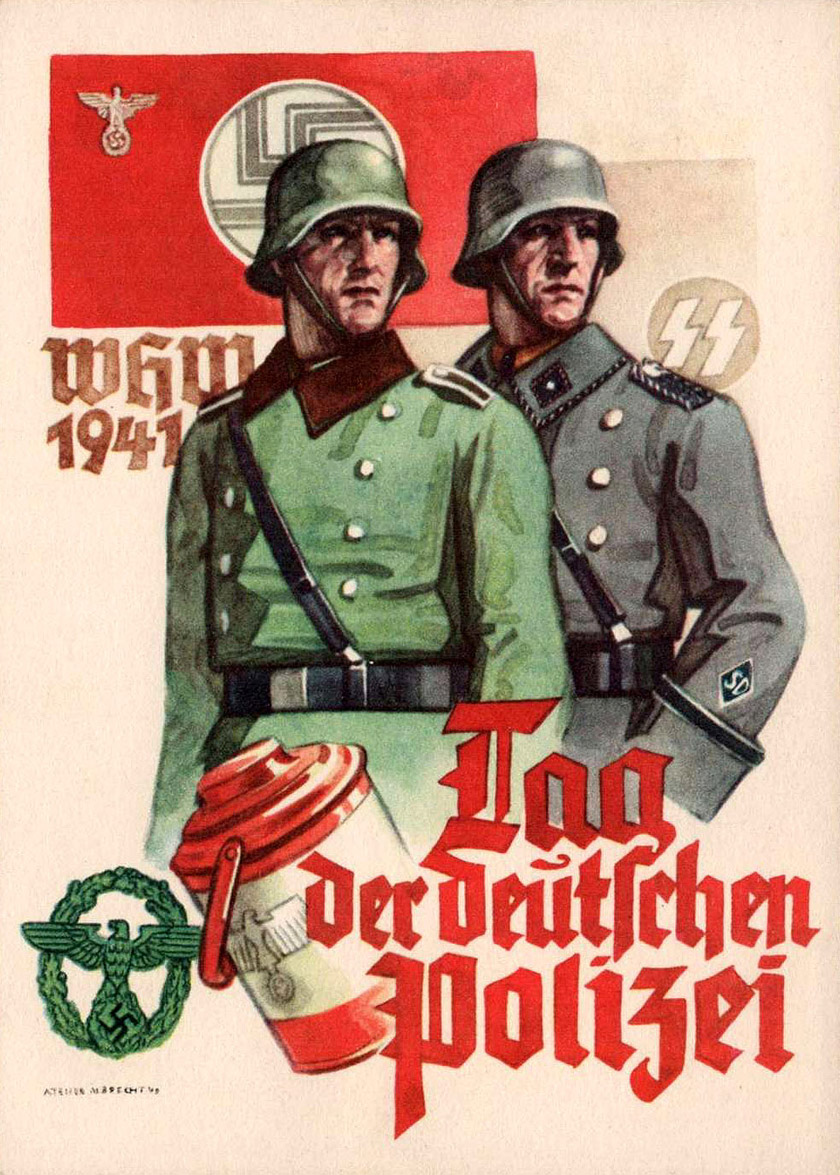
[Above: 1941 Day of German Police postcard from the Winterhilfswerk des Deutschen Volkes (Winter Relief of the German People, often referred to as WHW). If you look closely you'll see the donation can of the WHW.]
How did the French civilians view you, and did you have any problems with
them?
Heinz: No, there were not many problems in our area. I have heard other units
did have issues with civilians shooting at them or attacking them, but we did
not. We had to deal with some African soldiers who were made to fight for
France and committed crimes against French women.
Overall, I would say there was no love, but also no hate. We even
found time to get along with many of the prisoners and find out where they
were from, many would be sent back home after affirming they would not fight us again. Some of the French were cold to us, and turned their backs on
us while marching, but most just wanted to be left alone and were pleasant.
We could go eat and drink with no problems, and many men set off after
pretty French girls who were very flirtatious.
The French/German relationships got better and better in the
occupied areas and I never saw any problems.
You fought in the east with the police division, how was it for you?
Heinz: Russia is someplace I did not like to fight, it is very big and, back
then, behind the times. Most all roads were just dirt and when it rained it was
a nightmare. We were part of the northern army and fought in the worst areas
around Leningrad. This area was good for partisans, as they had many places
to hide.
The Russians were a much more formidable foe than I expected,
they had many more soldiers than we did. In the early months however
nothing could stop us, we pushed them back inflicting hard losses on them. I
remember seeing all the prisoners that were being moved to the rear, a funny
thing I saw was a Russian Hiwi [Hilfswilliger or auxiliary volunteer to the German army] platoon moving a few hundred prisoners with
only one German.
From the time Germany took up the challenge to defeat Stalin,
millions welcomed us as liberators and aided us. I mean that we had helpers
by the droves that came to ask if they could aid our fight. We had a woman
who had lost her husband in the 1930s to the Red Terror help our cooks.
It was not unusual to see Russian uniforms inside a German camp.
The people were very friendly to us as well, the Russians do not tell the story
correctly today. I remember going through Minsk [Belarus] in 1942 on my way home,
I saw all the rebuilding going on. The RAD, Red Cross, German welfare, and
new Russian welfare were there to rebuild what the war took away.
Today I am told by historians that we made slaves of the Russians
and forced them to work. This is not how I remember the east. We could
conscript civilians in emergency times for a short period. They had to be paid and well fed, I saw this only one time and it was Jews who had to help rebuild
a road. I could tell they hated the idea, but they still smiled and did what they
were told.
In the winter of 1941 it was very bad, we received some of the worst
weather in history, and the devil was against us. We received our winter
uniforms in October, but some units were very short of winter gear due to the
generals failing to work out the supply issues. The homeland came to the
rescue, and it was not uncommon to see men in furs and pink sweaters.
I went to an army supply depot where a sergeant was marveling at
the perfume smell of a sweater he just received. His aide was wearing a ladies'
fur hat; it was quite a sight to behold. Letters were pouring in from the school
children also and he gave me a bag to send back to our men. That December,
since Japan made a treaty with Stalin, he moved divisions to the west and
attacked us, driving us back and cutting many off.
We rebuffed the attacks and fought them to a halt, then we hit them
hard and by January we had regained lost land. They were beaten badly, and
their morale broken, we had many deserters come over to our side.
It was in the summer of 1942 that we started having problems with
partisans. These were mostly soldiers who were cut off and refused to
surrender; many Jews joined them now as well. I would like to tell you about
the Jews so that you understand. They had a hand in the Bolshevik revolution
and due to this, not only persecuted many people, but also grew in wealth and
power.
When we went into the Baltic States and Russia, the people rose up
before we arrived and they killed these Jews, even their families were not
spared in some cases. The rage was intense and could not be easily stopped.
I read an account in our paper where a man had been turned in by a Jew for
having anti-Jewish sentiment, he was sent to the prison to work. In the
meantime, the wife was arrested and their child taken by the state. He learned
his wife died of sickness and the child was adopted. He was freed by friends
when the guards fled, and he went to the home of the man who turned him
in, killing him, his wife, and children.
This was just but one example I know of, and I say this to you so
you know the Jews were not innocent people who did nothing to incur the
wrath of people. German units, even SS, had to stop this and in some cases
arrest the people who did these acts. Many were released once the truth came
out of what happened. These were revenge killings and they happened all
over areas where Jews had settled.
We had nothing to do with these, and in many cases stopped them
from getting worse. My men were law enforcement, so if partisans were
captured, we had the authority to execute them if so ordered. In many cases
they were Jews who failed to retreat with the Red Army.
Our time in the east was spent solely as combat units of the army
group, and the examples I gave you were very rare and did not happen very
often. Even the partisans were mostly held in check, once in a while
sabotaging rails or attacking a soft area. Most of 1942 was spent in constant
battles with the Russians who seemed to have nine lives.
We were suffering heavy losses as well, but our leaders did a good
job of keeping up morale. We had sport days, swim days, special dinners with dancing, and the performers from home would come to us. Life was rough,
but we managed to have a good time and enjoy ourselves as much as we
could.
Some men even had time to sneak off to flatter the nearest babushka [old Russian woman or grandma]
and get a nice home-cooked meal. We left the front to be moved to Greece
which was a welcomed respite, as the weather was better, and we had beaches
we could go to. It was like a vacation compared to Russia.
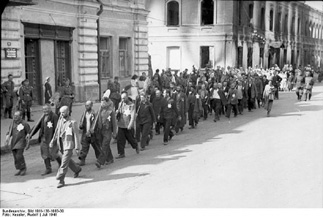
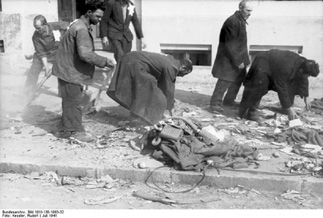
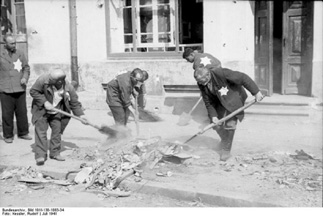
[Above: A Jewish work detail clears war debris, July 1941. Click to enlarge.]
Heinz: I really do not want to talk of any crime accusations; I can get myself
into trouble and get worked up. I will say it is sad there are such good liars in
the world, who all seem to line up against us. The context of the stories just
does not add up, we had orders contrary to what is shown today.
It would make no sense for any German units to kill unarmed,
innocent civilians for no reason. Sadly, this is being spoken more and more,
it is not true, and as far as I saw, never happened. Partisans who broke laws
of war are not protected by the same rules. We had crimes committed against
us by these small bands of both men and women, some quite unthinkable.
They knew what they were getting themselves into when they
started, often with Allied agents cheering them on. When caught, we had to
deal with them in a way that was merciful, yet just. These small reprisals are
now very inflated, exaggerated, and some just plain made up.
Do you believe Germany ever could have won the war?
Heinz: Ah yes, you said you would ask this. I know for certain we could have
if the Führer would have been better informed. I told you I had a friend who
was a physics man; he worked as an aide with Germany's best, even
[Werner Karl] Heisenberg. We met after the war and I will share what he told me in
confidence.
The US gets all the praise for inventing the first A-bomb, but
Germany split the atom first. Einstein was a fraud, and was being investigated
for plagiarism and stealing, that's why he ran away. Germany led the way in
nuclear research in the 1930s, the problem was the Führer only wanted it for
energy and no weapons.
He feared the weapon would open a pandora's box to extinction, my
friend said those were his words. He was impressed with the energy potential
and allowed financing for limited research and building of power projects.
Even later in the war, he refused to allow for nuclear weapons research,
research went on behind his back.
Our scientists were puzzled, as we led the world, and if given
permission would have had the bomb first. Instead, the Jews who fled
Germany stole the ideas, and then got the financing to make it work. They
planned on bombing Germany, a nation they claimed to have loved.
The Führer also knew the worst gas weapon of its time, from which
there was no defense; again he refused to allow its deployment due the loss
of life. You should see a pattern here, he was not a war lover, he was a peace
lover and did not want to fight. He even told Heisenberg he needed to get out
of the war in 1943, but the Allies would not allow it.
He had to keep fighting, yet he refused to allow deployment of
weapons that would have guaranteed victory, but at a large loss of life.
Instead, he allowed for all the projects with jets, U-boats, Panzers,
and other wastes. In spite of all this nonsense, Germany still had many
chances to win but I believe, as many do, that some around him lied to him
and cost us victory. The generals, who went on to live nice lives and write
their gloating memoirs, are more responsible for our defeat than the Führer.
Paulus is a good example; he became a full-blown communist, railing against
National Socialism and what we had built.
Last one, you won the Knight's Cross. How did this come about?
Heinz: Well, I was a late bloomer for medals and I was awarded this actually
after the war ended. I was told it was for the holding open of the Oder to
allow not only military units to escape the Red Army, but also the countless
civilians from the east. Many bridges had to be held to get vehicles and horses
across, my men put up a terrific defense to achieve this, wrecking many Red
Army units who tried to beat us back.
We would use every trick in the book, and our pocket held long
enough to get the main units to German lines. Our Luftwaffe even made
appearances, I saw Hans Rudel [the greatest bomber pilot in history] come in and rake Russian columns in the
distance, you could tell by the cannons under his wings.
We really made them pay for every inch of German territory in
1945; my men were the bravest I could ask for. They fought like lions even
with defeat facing us and an uncertain future.
The only thing that mattered was keeping the Red Army away for
as long as we could, so more people could escape. I was quite surprised when
I found out I was put up for the award and approved. This was Germany's
highest military award, and I was very proud to be counted as a bearer.

[Above: SS Police Division cuff title.]
[Above: Armored vehicle with the police eagle painted on the side.]
[Above: A valiant knight from the SS Police Division mourns his comrade, his bones planted like seeds in the sleeping Russian earth.]
